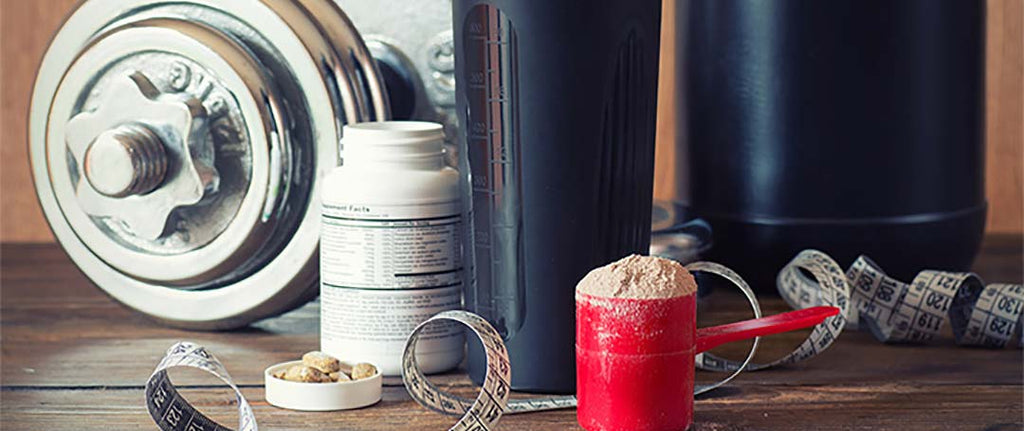The Truth About Supplements

When competing, we do everything possible to get all odds on our side, whether it being training for months prior or eating well to improve performance. Eating well can also entail taking supplements to make sure we finish first. However, with so many products on the shelves, there is a lot of confusion on which supplements are helpful and which are just a product of good marketing.
Protein Powders
Protein is essential in a healthy diet as it is needed for growth and development, to build and maintain muscle and to produce hormones, enzymes, and red and white blood cells. Athletes need more protein than inactive individuals, but are protein supplements really the way to go?
Protein supplements, in the form of whey, casein, soy, etc. offer a portable, convenient source of protein and calories, especially when combined with a source of carbohydrate like milk/soy drink, fruit, yogurt, and/or juice. However, supplemental protein (powders, bars and drinks) sometimes lack essential carbohydrates, vitamins, and minerals (such as iron, calcium, zinc) found in natural foods. So, if taking protein supplements, make sure to have a varied diet to make sure you are not missing any key nutrients.
It is also important to note that excess protein from the diet and/or supplements will be either used for extra energy (if calories are too low), excreted as waste, or may be stored as body fat (if calories are too high). Therefore, protein should be consumed in moderate amounts of about 30 grams per meal, and not more (in most situations), to promote muscle growth. To get an idea of the amount of protein, a serving of 25-30 g of protein per meal is the equivalent of:
- 90 g of cooked chicken breast, beef, fish or pork (about the size of the palm of your hand or of a deck of cards);
- 2 eggs with an ounce of cheese;
- 1 scoop of most protein powders
Athletic Aids
* To ensure the safety of all products, check the label for a natural product number (NPN) or drug identification number (DIN), which indicates that the product is licensed and approved for sale in Canada.
Beetroot juice
Nitrates, which are found naturally in many vegetables and in high quantities in beet root, offer promising results in terms of performance improvement. Once consumed, nitrates get converted to nitric oxide. Nitric oxide opens up blood vessel, thereby allowing more blood and oxygen to be delivered to muscle and improving performance. Beetroot juice is a more convenient and compact source of nitrates than the whole vegetable and can be made at home or purchased as concentrated “shots”, which requires an even smaller volume to get the same amount of nitrates. For potential benefits, beetroot juice must be consumed in amounts of 140 – 500 ml for several days before the event. On event day, beetroot juice should be consumed 1.5 - 3 hours ahead of the event.
Branched-chain amino acid (BCAA)
Amino acids are protein’s building blocks and come in different structures. Branched-chain amino acids are so named for their structure. When glycogen (stored glucose in the liver and muscles) is low, BCAA are broken down to produce energy. They also happen to delay mental fatigue and improve the immune system. In theory, higher amounts of BCAA could provide fuel when stores are low and could help in delaying fatigue. Unfortunately, studies in athletes who supplemented with BCAAs haven’t been able to prove these results. Still, BCAA are safe if taken at the recommended dose.
Caffeine
Caffeine stimulates the nervous system and makes us feel more aware while decreasing our perception of effort. Benefits are seen at a dose of 2 to 3 mg of caffeine per kilogram of body weight. For example, a 150 lb athlete would need 140 mg of caffeine. However, for those who are sensitive to caffeine’s effects or who take a very large dose, they can feel a rapid heart rate, dizziness, lightheadedness, and jitteriness.
Creatine
It has been used by athletes for decades to help build muscle. Creatine works by restoring energy faster between high intensity exercise efforts. Therefore, if an athlete can recover faster after lifting a set of weights, they may in turn be able to do more training and this will lead to building muscle and increased lean body mass. However, creatine supplementation does not improve performance in exercise events that rely primarily on the “aerobic energy system” (exercise greater than a few minutes in duration and endurance exercise such as distance running, cycling and swimming). Also, some athletes may experience weight gain, water retention, and increase the risk of tearing tendons or ligaments.
Note: The information included is based on the best available evidence at the time and may not be applicable for all athletes. Please consult your local dietitian to get personalized advice.
Sources:
Kreider, R. B., Wilborn, C. D., Taylor, L., Campbell, B., Almada, A. L., Collins, R., . . . Antonio, J. (2010). ISSN exercise & sport nutrition review: Research & recommendations. J Int Soc Sports Nutr Journal of the International Society of Sports Nutrition, 7(1), 7. doi:10.1186/1550-2783-7-7
Lundberg, J. O., Carlstrom, M., Larsen, F. J., & Weitzberg, E. (2010). Roles of dietary inorganic nitrate in cardiovascular health and disease. Cardiovascular Research, 89(3), 525-532. doi:10.1093/cvr/cvq325
Position of the American Dietetic Association, Dietitians of Canada, and the American College of Sports Medicine: Nutrition and Athletic Performance. (2016).
Rosenbloom, C. (2012). Sports nutrition a practice manual for professionals. (5th ed.). Chicago, Ill.: Academy of Nutrition and Dietetics.
Siervo, M., Lara, J., Ogbonmwan, I., & Mathers, J. C. (2013). Inorganic Nitrate and Beetroot Juice Supplementation Reduces Blood Pressure in Adults: A Systematic Review and Meta-Analysis. Journal of Nutrition, 143(6), 818-826. doi:10.3945/jn.112.170233
Zeina is a registered dietitian-nutritionist and is part of l’Ordre professionnel des diététistes du Québec and Dietitians of Canada. She currently works at Le Fitness Loft Kinesiology Clinic in Dorval where she consults an active clientele that desires to change their lifestyle habits, whether it is to lose weight, increase muscle mass, improve performance or simply live healthier. Zeina has a passion for teaching and conveying her knowledge about overall healthy eating habits and makes sure every client receives personalized recommendations based on their lifestyle and preferences. For more tips and tricks visit www.TheFoodieRD.com
Join Source Nation to get the latest news on product launches, Source Exclusive product lines, tips and tricks for parents and players, and more!



